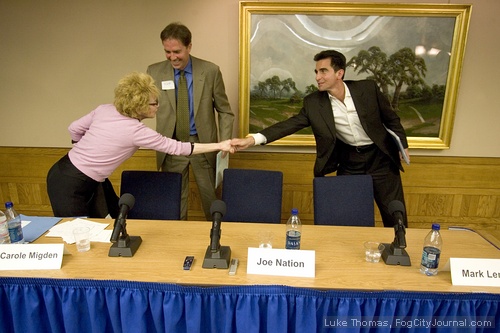 Â
Â
California Senate District 3 candidates Senator Carole Migden,
former Assemblymember Joe Nation and Assemblymember Mark Leno
engaged in a cordial debate Tuesday at the UC Hastings College of Law.
Photos by Luke Thomas
By Nicholas Olczak
March 19, 2008
Candidates for the California District 3 Senate seat engaged in a cordial debate yesterday at the UC Hastings College of Law in San Francisco.
The candidates began by drawing from an envelope the order they would make their opening statements. “I hope there’s a dollar bill in there, joked Carole Migden,” smartly diffusing some of the tension around news that she’d been fined a record amount by the the California Fair Political Practices Commission(FPPC).
Mark Leno got the first opening statement and leapt eagerly up to the podium. He said he was “fighting the fights nobody had taken up before.” He cited as an example his amendment to the Ellis act, which restricts landlords’ powers to evict tenants. He said he was also working to prevent discrimination against housing and employment seekers, particularly the discrimination against those in the LGBT community. Stressing this equal rights theme, he said he was closely involved in the Marriage Equality Bill “getting to the Governors desk not only once but twice.”Â
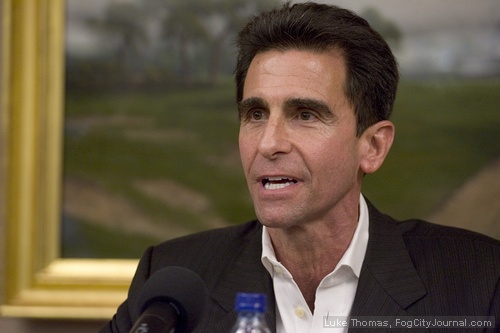
Assemblymember Mark Leno
Carole Migden was next up. “I believe I’ve been doing well, I get things done,” she began forthrightly. In her time as senator, she said that she had got more bills into law than anybody else. She listed a 2007 bill which allows HIV positive people to have healthy children, the blocking of high rises on San Francisco’s Embarcadero, the clean water act, and the safe cosmetics act as some of her achievements.
“I pride myself on taking hard things and getting results done,” she concluded.Â
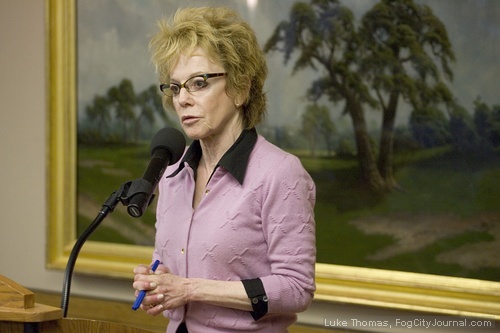
Senator Carole Migden
Joe Nation said he was the ‘least well known’ of the candidates. Giving an overview of his background, he said he taught health care, public policy, and climate change at Stanford, and worked for environmental consultancy firm Environ International. He said his political role was a natural extension of this because “there is no greater challenge” than Climate Change today. The AB-32 climate change legislation, which he authored, was not enough he said, and he would press for more changes. Other focuses included universal healthcare, education, and alternative transportation. He stressed that as an assemblyman he’d passed over 50 bills.
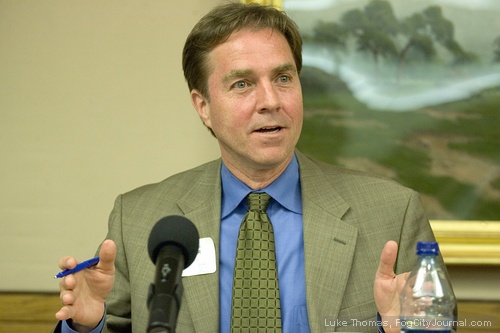
Former Assemblymember Joe Nation
General topic questionsÂ
What are you doing about the budget cuts?Â
Carole Migden stressed that the budget difficulties were largely due to Governor Schwarzenegger’s suspension of the vehicle license fees (VLF) which would have provided $20 million dollars. She said California was a large, populous state with a significant ‘economic engine’ which could be used to generate revenue.Â
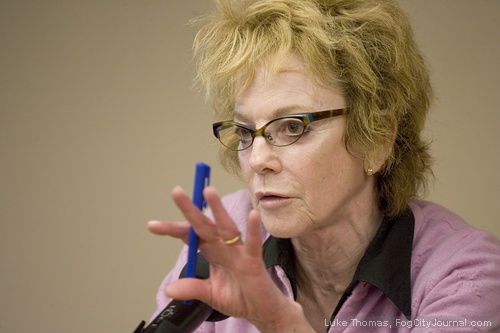
Joe Nation began by pointing out that he “cut [his] own budget by 25 percent”, saying that he felt it was “not appropriate” for him to get money when others were in crisis. He said that he would shift from the current trend of ‘short term solutions’ instead looking for something longer lasting. He said he would pursue the re-adoption of vehicle license fees, but also hoped to “lower and broaden” sales taxes.
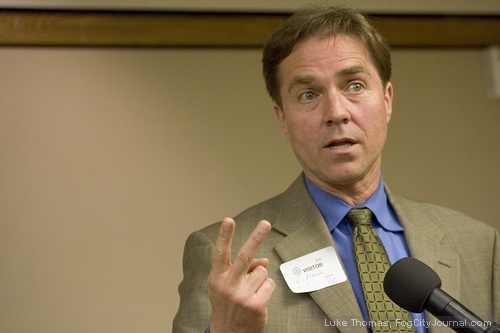
Mark Leno emphatically stated that we only have a budget crisis because Arnold Schwarzenegger took away vehicle license fees. “I hope everyone is clear on this,” he said. He shared Carole Migden’s belief that this legislation needed to be re-introduced.Â
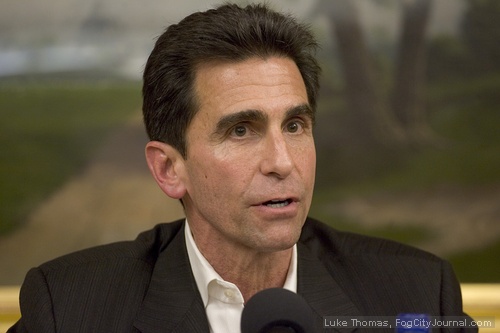
The future of Higher Education:Â The California Masterplan promised an education system of the highest caliber that provided quality access and affordability. The US has become one of the finest institutions for learning in the world, but in this year of budget cuts is this vision for higher education still a reality?
Joe Nation described the University of California as ‘a great system’ but conceded that it was getting ‘tougher because of increases in fees’. He said we need to step back from this and talk about priorities, stating that “we may have one of the best education systems in this country, but we also have the fastest growing prison system in this country.” He called it “obscene” that in 4 or 5 years California would be spending more on prisons than higher education. He said he would fight those expenditures and “shift resources over into higher education.”
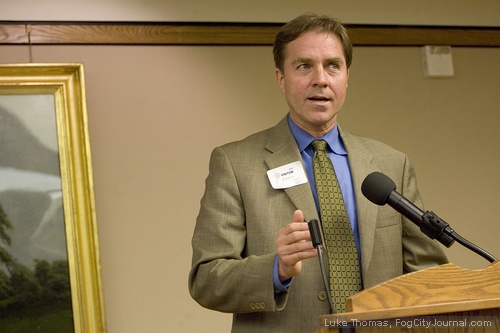
Mark Leno said that California became the eighth largest economy in the world because we “rightfully” invested in the best higher education system. He said that in the 60s and 70s, 60 percent of the University of California budget came from general funds, while today it is only 30 percent. This forced the University of California to raise fees, he argued, and it meant that 100,000 people had chosen to study elsewhere. He blamed the Republican majority, stating, “The Governor and our republican colleagues are starving the state for cash.”
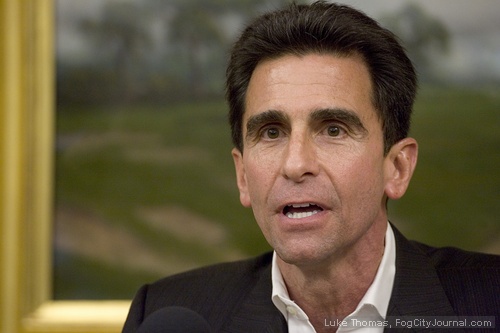
Carole Migden said California needed to gain the progressive majority and keep progressive values. She said she opposed the Edloan funding program because it coupled high fees with “scandalously” high interest rates on loans. “We want to make sure that there are ample and generous loan opportunities… and moreover that we don’t privatize loan companies’ so that students don’t get into a debt cycle,” she declared.Â
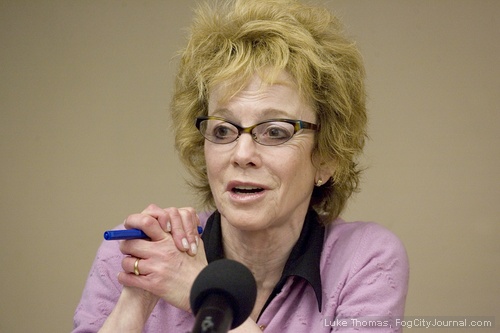
Individual Questions – ‘The rough and tumble of politics’
Mark Leno was asked how he reconciles his campaign for political ethics with the LA Times reports that he amended a bill on behalf of the rental car industry and subsequently received $20,000 in campaign contributions from car rental companies.Â
Leno responded that Carole Migden and 70 other colleagues also voted for the car rental bill. He said the bill provided $50 million new non-general fund dollars, promoting California as a tourist destination and creating hundreds of thousands of jobs. He said he “worked with the Consumers Union to make sure they were neutral on the bill” and that it is “just one man in San Diego who has a problem.”
He was also asked about a Sacramento Bee report that reported he held a $1000 per-person fundraiser for lobbyists the day before the committee he chaired heard 600 bills totaling $8 million dollars in spending.
Leno responded that if one reads the Bee’s article it reports a number of lobbyists stating that “Mark Leno is without reproach.” Leno added that “there is nobody in Sacramento who suggests [his] work is in any way tied to contributions.” He said that such questions prompted him to campaign for the abolishment of special interest money.
Carole Migden was asked to explain her “repeated violations of finance law.” She was yesterday fined by the FPPC $350, 000 for 89 total violations, failure to report expenditures on time, inaccurate disclosures of cash payments, and personal use of campaign funds.Â
“I’ll tell you the truth, and this is no duck,” Migden declared. “I was, ten years ago, very ill…..some things were slack. I had people who were professionally trained who handled the reporting for me.” She stressed that when she found the errors she reported them, she went to the FPC, and she hired a profession audit team. She said she was working with the FPC and had “agreed to take responsibility for those errors, completely, totally.” She added that she was glad of the opportunity to address this.
Joe Nation was asked to explain why he chose to run even though there was another suitable candidate. It was put to him that this forced activists and donors to spend resources on his campaign instead of investing in the many other campaigns also occurring this year.
Nation said ‘I believe in democracy.”Â
The NCAA “March Madness” endorsements
To soften the tone after the personal questions, the candidates were asked who they would endorse for the ‘March Madness’ tournament. Carole Migden pointed out that this was a somewhat gender biased question, before settling on Stanford. Joe Nation followed suit, saying that because he taught at Stanford he had no real option. Mark Leno said he didn’t really follow this, saying people might call him “gender variant.”
Questions from UC Hastings Student Groups
The Outlaw Organization, a LGBT group at Hastings, asked what steps each of the candidates would take towards equal marriage rights. They asked how Carole Migden would respond to criticism that she was too incremental and Mark Leno to criticism that he was too forthright.
Joe Nation began by saying that he would campaign “aggressively” for equal marriage rights. He dismissed fear of a “backlash”, saying this doesn’t really matter when you’re talking about a basic human right.
Mark Leno said he felt “all progress was incremental.” He said when he suggested introducing the Marriage Equality Bill there was debate and fear of backlash but he had a “gut feeling, an instinct, it was the right time.” He defended his forthright attitude saying, “you can’t compromise on equality.”
Carole Migden said marriage equality is “the civil rights issue of the new century.”
The President of Hastings Homeless Legal Services, and organization providing legal assistance to homeless citizens, asked what the candidates’ views on San Francisco’s Community Court were. He suggested that the court, arresting people for activities such as urinating in the street, could be accused of criminalizing the homeless. He asked if money could be better spent elsewhere.
Mark Leno said that the “jury was still out on the effectiveness” of this program. He said that we “should not criminalize homelessness, poverty, or hunger.” He said that he had been involved in measures centering on hunger, helping to pass legislation allowing access to food stamps for those with convictions.
Carole Migden said that she opposed the Community Court. She said she was in favor of “wraparound service like they do in New York.” It was necessary to increase the incentive to get people off the street, she added.
Joe Nation stated that we “should not criminalize” the homeless and said he was in favor of a “one-stop” program. He believed it was necessary to “look at the causes” of poverty and homelessness and work out “how to treat them.” He also highlighted the need to focus on substance abuse programs. Pointing to his work with veterans, he said this had given him an understanding of the issues surrounding homelessness and how to help people “get back on their feet.”
The candidates were then asked if race was still relevant today and what they would do to address the widening gap between African Americans and other populations.
All three candidates agreed that race was still highly relevant.
Carole Migden spoke of her work helping African Americans. “We’ve shed off certain barriers,” she said, “but we should not have jails be the home of young black men.”
Joe Nation said that race was still too relevant and people “default to that position.” He pointed to the difference in school tests scores for different racial groups. He said the state needed programs targeting kids “on a micro level” – identifying those with problems in particular schools.
Mark Leno agreed that race was still an important issue and praised Sen. Barack Obama for addressing the issue “directly.” He highlighted his zoning work on the Board of Supervisors, saying this helped ensure different communities had equal rights over property.
The Reverse Interview Questions
Candidates were asked to describe the strengths and weakness of the other two candidates.
Mark Leno said Joe Nation “tried to bridge gaps” and praised Carole Migden’s ability to fight for legislation. He said however that Migden’s ethical gaps were her weakness.
Carole Migden initially asked that they skip this round, but then rose forcefully. She said that Joe Nation was “genial” but would be better solving Global warming than serving as a Senator. She said that Mark Leno was a “smart dresser” but should not quote ethics to her when he himself had been challenged on that.
Joe Nation handled the question diplomatically and exploited the opportunity to sell himself a little. He praised Carole Migden as “tenacious” and Mark Leno as “passionate” before adding that he hoped to combine these two qualities.
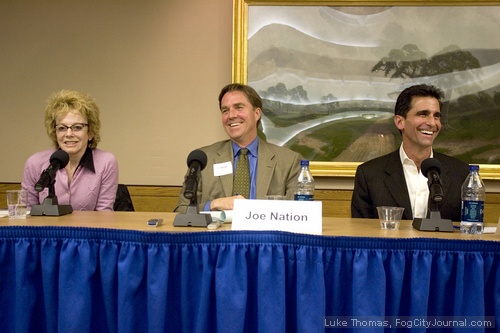
Closing Statements
Mark Leno begun by apologizing for needing to rush off after the debate, highlighting that he was receiving an award for his work on the transparency of government. He said he regretted that they hadn’t debated healthcare, stating that he supports “single-payer universal healthcare.” He finished by declaring that “the promise of California is the promise of hope and opportunity.”
Joe Nation said that he had decided to run because he wanted to help solve the world’s climate change crisis. He believed that California could determine Federal policy on this subject. “We need leaders on that issue,” he said. He hoped that he could make “a significant impact on environmental policy.” However he stressed that he’s not a single issue candidate.Â
Carole Migden said that she would fight to keep more of State funding in the Bay Area. “You bet we better be precious with our money,” she said, stressing that north California and south California looked after their own financial interests. She said people should vote for her because she was one of a “dwindling” number of women in politics. “I’m not just an easy vote, I’m not just a good vote – I’m the kind of person who brings results,” she concluded.
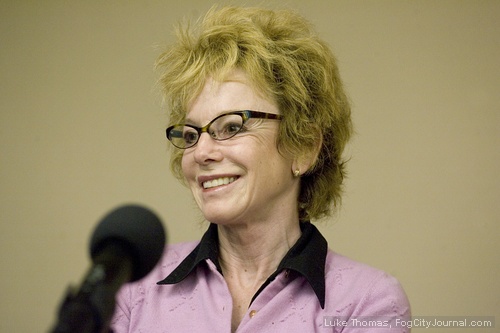


 The Hunger Site
The Hunger Site
March 19, 2008 at 5:22 pm
If the Revolutionaries in the government would have respected the will of, “We the People” and enacted California’s Proposition 187 instead of deceitfully overturning it we may have avoided these problems.
Not only is this affecting the school budget, we have been lied to, cheated, and stolen from in regards to illegal immigration for so long many of us no longer believe a word they say.
March 19, 2008 at 4:13 pm
Instead of tinkering with the Vehicle License Fee and copping out by demagogically blaming Schwarzenegger and the Big, Bad Republicans for holding California’s tax system hostage, all three candidates — whether they get elected or not — should make it their mission in life to repeal Prop. 13, thus solving all of these problems (and countless others) in one fell swoop. It may be a third-rail, politically, and they may earn the undying enmity and ridicule of their colleagues, but if any of these three candidates were to keep viciously, ruthlessly and relentlessly hammer that catastrophe day after day, year after year, people are finally going to get it. Who knows? They may even get a Sacramento building named after them for their efforts.
To their credit, I think that all three candidates believe Prop. 13 should be repealed, but lip-service, in itself, doesn’t mean dick.